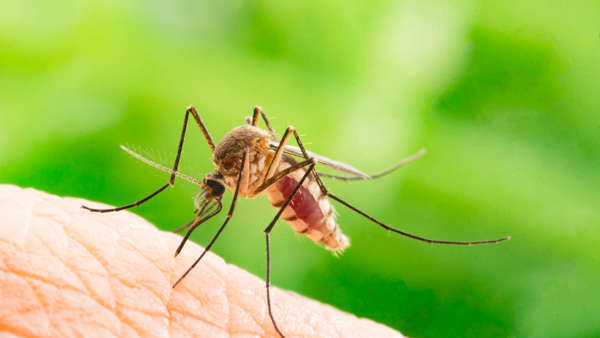State and local health officials are advising residents to take precautions to prevent mosquito bites.

Shutterstock photo.
(Franklin County, Ind.) - The Indiana Department of Health (IDOH) and the Franklin County Health Department have confirmed that West Nile virus has been detected in mosquitoes in Franklin County.
Five mosquito pools were tested in Franklin County with two testing positive for West Nile virus. Dearborn, Ripley, and and Ohio counties have also reported two positive pools, while Switzerland County has one.
To date, there are four confirmed cases of West Nile virus in humans, but none are in the southeastern Indiana region.
State and local health officials are advising residents to take precautions to prevent mosquito bites, as WNV can pose serious health risks.
- Use insect repellent. Apply EPA-registered insect repellents containing DEET, picaridin, IR3535, oil of lemon eucalyptus, para-menthanediol, or 2-undecanone according to the label instructions.
- Wear protective clothing. Wear loose-fitting, long-sleeved shirts and pants. Consider treating clothing and gear with a permethrin product (note: permethrin products should not be applied directly to the skin).
- Know when to expect mosquito bites. The Culex species of mosquito is responsible mainly for WNV and is primarily active between dusk and 1 a.m. and at dawn. Taking precautions to avoid bites between dusk and dawn is recommended.
Furthermore, homeowners, landlords, and property managers should take the following steps to control mosquitoes indoors and outdoors:
- Install screens on windows and doors and keep them in good repair.
- Look for containers that could hold water, such as trash, tires, buckets, toys, pools, birdbaths, flowerpot saucers, or trash containers.
- Prevent mosquitoes from accessing containers. This can be done by removing trash, moving items indoors, covering or overturning items not in use, drilling holes in the bottom of trash containers, installing screens on rain barrels, replacing water in pet bowls daily, and flushing birdbaths, fountains, and other containers at least once a week.
- Maintain properties and landscaping in good condition. This includes regularly servicing septic systems, mowing grass and trimming shrubs, cleaning gutters regularly, and aerating ornamental pools or stocking them with predatory fish.
Most people infected with West Nile virus have no symptoms or only mild flu-like symptoms, which can include fever, headache, body aches, joint pain, vomiting, diarrhea, or a rash. Some people infected with West Nile virus will develop a more severe form of the disease affecting the nervous system, including inflammation in the brain and spinal cord, muscle paralysis, or even death. People older than 60 years old and those with weakened immune systems are at higher risk of severe West Nile virus disease. People who think they may have West Nile virus disease should see their healthcare providers.
To view the Indiana Mosquito-Borne Activity Dashboard and learn more, visit: https://www.in.gov/health/idepd/zoonotic-and-vectorborne-epidemiology-entomology/vector-borne-diseases/mosquito-borne-diseases/.

 Aurora Emergency Rescue, Community Project Partner for Toy Drive
Aurora Emergency Rescue, Community Project Partner for Toy Drive
 Award Winners Recognized at 2025 Dearborn County Chamber Dinner
Award Winners Recognized at 2025 Dearborn County Chamber Dinner
 National Collection Week Begins for Operation Christmas Child
National Collection Week Begins for Operation Christmas Child
 Truss Bridge Rehabilitation Continues on State Road 46 over Whitewater River
Truss Bridge Rehabilitation Continues on State Road 46 over Whitewater River
 RCCF Supports Local Nonprofits
RCCF Supports Local Nonprofits
 Batesville High School Drama Club Presents Weekend of Fairy-Tale Theater
Batesville High School Drama Club Presents Weekend of Fairy-Tale Theater













